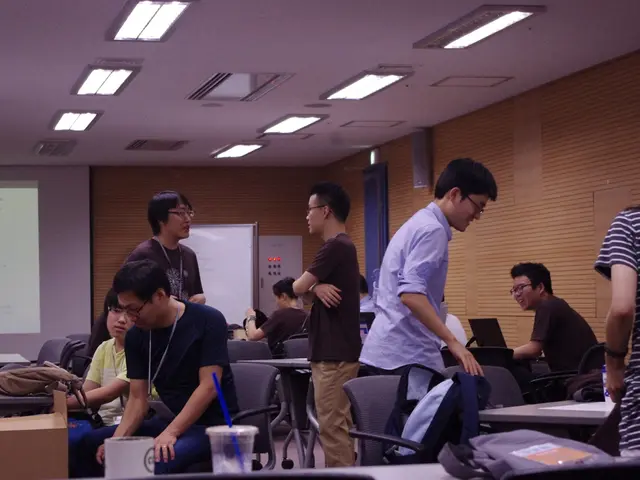Alternative financing approach for certain university students: Loans with zero interest and no fees incurred
In the heart of Honolulu, Joshua Alferos found himself two semesters away from completing his electrical engineering degree, but short on cash. With his financial aid exhausted and family savings depleted, he was on the brink of changing majors or dropping out. That was before he stumbled upon an innovative solution: a pay-it-forward loan program.
These experimental programs, funded by philanthropies and private businesses, offer zero-interest loans to low-income students to cover their tuition costs. The debt doesn't come due until the student earns a minimum salary, at which point, their employer often assists with repayment. Better yet, the repaid debt goes back into a pool to help other students like Alferos.
"It's empowering because you can help future students," Alferos said, relaxing on the student center terrace at the University of Hawaiʻi, where this pay-it-forward approach allowed him to stay and continue his studies.
The pay-it-forward approach extends the reach of limited financial aid resources by allowing each borrowed dollar to be loaned out multiple times. This concept has gained support in over half of state legislatures nationwide, aiming to fill workforce shortages in critical industries. However, many states have yet to adopt this idea due to high startup costs and other issues.
Because of the success of this pilot program, other states and organizations are launching similar initiatives. For instance, pay-it-forward programs have been or will be starting this fall in Colorado, Massachusetts, New Jersey, New York, Miami, and San Diego. Each program focuses on fields where there's a high demand and short supply, like healthcare and information technology in Colorado and New Jersey, and climate careers in Massachusetts.
In California, a proposed bill aims to create a pay-it-forward fund for some students in the University of California and California State University systems, beginning in 2028. The fund would initially support at least 10,000 students by fall 2030, who would repay the money as a proportion of their income.
On the other hand, California's proposed fund is not narrowly focused on a specific field—instead, it targets students across various fields. In contrast, a pay-it-forward fund starting this fall in San Diego will specifically target majors in behavioral health, addressing a collective shortfall of 8,000 workers in this field. Loans in this program will be entirely forgiven for graduates who work in behavioral health for five years or more.
"Design these programs with economic development and employment needs in mind," advises Kirstin Hill, president and COO of Social Finance, a nonprofit that designs and manages pay-it-forward funds across the country.
While momentum for pay-it-forward funds continues to build, skepticism remains among students who have previously encountered misleading promises or unresponsive loan servicers. As these experimental programs evolve, they present a fresh approach to addressing financial barriers in higher education, offering the opportunity for students to support each other in their pursuit of success.
Alex Harris, vice president at the Harold KL Castle Foundation, the lead funder of Hawaii's Renewable Learning Fund, summed it up: "It's a new way of thinking about scholarship support that lets you extend your dollars."
Stay informed about innovations in higher education by subscribing to our free bi-weekly higher education newsletter.
[1] https://www.nj.gov/governor/news/news/562020/approved-bills/20200701c_s3060_massaro.shtml [2] https://www.socialfinance.org/our-work/pay-it-forward/ [3] https://www.1000college.org/pay-it-forward/
- The pay-it-forward approach in higher education, though still experimental, offers a novel solution to financial barriers, enabling students to help their peers by repaying zero-interest loans that were initially used for their tuition.
- Innovative pay-it-forward loan programs, funded by philanthropies and private businesses, are not only helping low-income students complete their education but also addressing workforce shortages in critical fields, such as healthcare, information technology, and climate careers.
- While pay-it-forward funds like California's proposed bill are designed to extend the reach of limited financial aid resources, it's crucial for these programs to be focused on education-and-self-development fields with high demand and short supply, as well as employment needs, for maximum impact.





